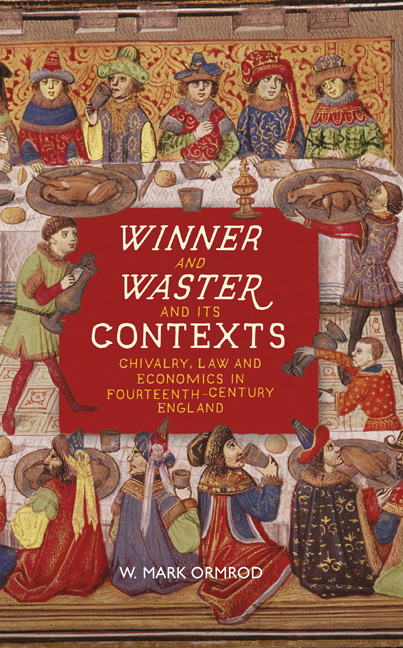Book contents
- Frontmatter
- Contents
- Acknowledgements
- Note on Editions
- List of Abbreviations
- Introduction: Winner and Waster: A Poem on the Times
- 1 Chivalry and Internationalism: The Garter Feast of 1358 and English Diplomacy during the 1350s and 1360s
- 2 Treason, Public Order and Dispute Settlement: The Statute of Treasons of 1352 and Royal Arbitration
- 3 Landed Society, Conspicuous Consumption and the Political Economy: The Sumptuary Laws of 1363
- 4 The Private and the Public Spheres: The Royal Household and State Finance under Edward III
- 5 Satire, Complaint and Authorship: Winner and Waster and the Alliterative Revival of the Fourteenth Century
- 6 Winner and Waster: Timeliness and Timelessness
- Appendix 1 Timeline, 1337–70
- Appendix 2 A Modern English Version of Winner and Waster
- Bibliography
- Index
- Publisher̕s Note
4 - The Private and the Public Spheres: The Royal Household and State Finance under Edward III
Published online by Cambridge University Press: 09 April 2021
- Frontmatter
- Contents
- Acknowledgements
- Note on Editions
- List of Abbreviations
- Introduction: Winner and Waster: A Poem on the Times
- 1 Chivalry and Internationalism: The Garter Feast of 1358 and English Diplomacy during the 1350s and 1360s
- 2 Treason, Public Order and Dispute Settlement: The Statute of Treasons of 1352 and Royal Arbitration
- 3 Landed Society, Conspicuous Consumption and the Political Economy: The Sumptuary Laws of 1363
- 4 The Private and the Public Spheres: The Royal Household and State Finance under Edward III
- 5 Satire, Complaint and Authorship: Winner and Waster and the Alliterative Revival of the Fourteenth Century
- 6 Winner and Waster: Timeliness and Timelessness
- Appendix 1 Timeline, 1337–70
- Appendix 2 A Modern English Version of Winner and Waster
- Bibliography
- Index
- Publisher̕s Note
Summary
The aspect of the political economy that has attracted the most enduring attention of scholars working on the social meanings of W&W relates to Edward III's household management and war finances. The idea that the poem provides a commentary on the financing of the Hundred Years War goes back to a short article by Gardiner Stillwell published in 1941. Stillwell argued that Wynnere's opening speech represented Wastoure as the personification of the state, unjustly extracting hard-earned resources from its subjects to finance its own proud ambitions:
‘Bot this felle false thefe that byfore yowe standes
Thynkes to strike or he styntt and stroye me for euer.
All that I wynn thurgh witt he wastes thurgh pryde,
I gedir, I glene and he lattys goo sone,
I pryke and I pryne and he the purse opynes.
Why hase this cayteffe no care how men corne sellen?’
(lines 228–33)(‘But this wicked, false thief who stands before you
Thinks to strike me down and destroy me for ever.
All that I win by my wits, he wastes through pride,
I gather, I glean, and he lets it all go,
I pinch and I save, and he opens the purse.
Why does this scoundrel have no care how corn is sold?’)
Convinced by Gollancz's dating of the poem to 1352–3, Stillwell compared this passage to the formal record on the parliament roll of 1352 of the grant made by the Commons to the king of a three-year fifteenth and tenth (the standard form of taxation that had been in place in England since 1334). This schedule included a statement that ‘le commune people de la terre fut molt empovery, sibien par la pestilence mortiele qe nadgairs avient en la terre come par autres soviers taxes, taillages et plusours autres chevances qe les ont survenuz’ (‘the common people of the land [are] greatly impov¬erished, as much by the deadly pestilence which they recently suffered in the land as by the frequent taxes, tallages and many other levies which have befallen them’). This was apparently enough to convince Stillwell that the passage in W&W just cited was a veiled allusion to public discontent with the unreasonable economic burden that the king's wars placed on the coun¬try at precisely the moment that the Commons made their tax grant in 1352.
- Type
- Chapter
- Information
- Winner and Waster and its ContextsChivalry, Law and Economics in Fourteenth-Century England, pp. 83 - 104Publisher: Boydell & BrewerPrint publication year: 2021



